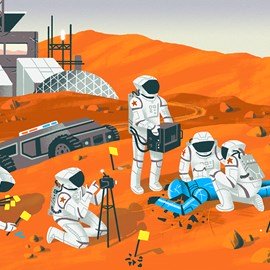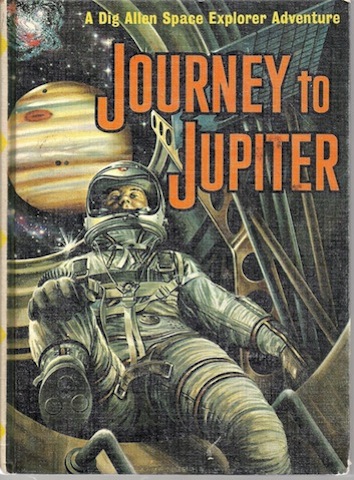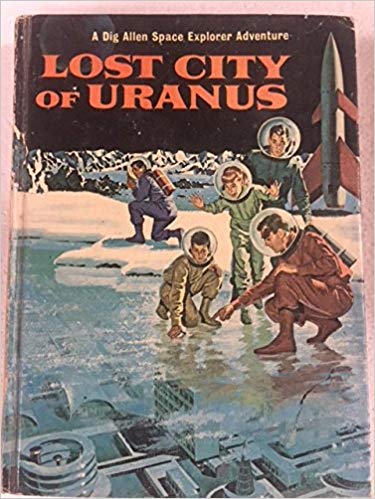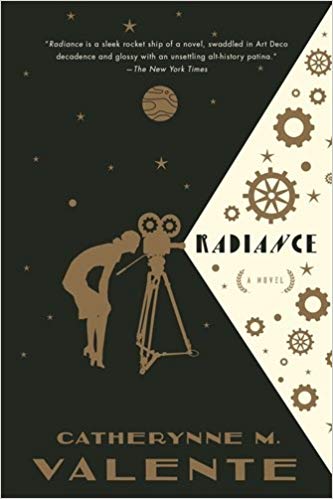- Home
- OSS clues, NOSS News
OSS CLUES, noss news
traces to follow
 by Matt Chinworth
by Matt ChinworthReaders are invited to use and to contribute to this log of literary discoveries, clues or rumours.
The merest trace may be worth a follow-up. So, whether you've merely come across a hearsay report of an intriguing story-title, or whether you've actually read a little-known but mentionable tale, or whether any info of intermediate exactitude has come into your possession, don't be shy to share it.
2019 January 5th:
IRUWON
If you've received your copy of Vintage Worlds you'll probably have plunged far enough into it by now to reach the dénouement of the anthology's opening tale, John Michael Greer's Out of the Chattering Planet.
In which case, you need fear no "spoiler" if I share with you some more information about JMG's version of Mars, whose inhabitants name it Iruwon. It's obvious that he's planning more adventures on that world. So, for those who have read the first story and want to know more, here's what he's emailed me about native life on the Red Planet:
"The Iru look a little like tall, spindly bipedal white-furred foxes with four arms, but they're not mammals. They have castes like honeybees: sayende, who are egg-laying females and run things; ellore, who are fertile males and are the intellectuals and martial artists of the species; and eshone, who are sterile females and fill the other economic niches. There are eighteen sayende on the entire planet of Iruwon ("world of the Iru" - they call our world Umawon, "world of the humans"), each one mistress of a well - which means not only a deep water source, but the entire social structure, urban complex, and agricultural hinterlands appertaining thereto. New sayende can be produced at any time from eggs by appropriate tending, so there's no shortage of sayende, and sayende produce a phenomenal number of eggs, so there's no shortage of Iru. Each well is an independent political entity governed by its sayendu, in council with her ellore, and with a silent but decisive veto power in the hands of the eshone, who can register their displeasure with a sayendu by starving her to death, as mature sayende are too big to move and can do very little for themselves. The eighteen sayende govern the planet by consensus, or bicker decorously for centuries when consensus can't be reached.
"Okay. So the sayende have probably been bickering about what to do with upstart humanity since, oh, the end of the 19th century, when it became clear that the humans of Umawon were likely to get interplanetary travel down in due time. The policy of concealment and hijacking of interplanetary probes was a compromise; there are some sayende who think the best move is to open up trade relations, others who think that bacteriological warfare to reduce human populations on Umawon to a million or so shell-shocked survivors would be a better move, and still others who are hoping that we'll blow ourselves to smithereens or find some other way to crash and burn, and save them the trouble of having to come to a decision.
"It's quite possible that Tegwyn Jones' arrival on Iruwon might tip the balance in such a way as to move things toward a consensus -- but we'll see. I'm still wrestling with the last book of The Weird of Hali and that's occupying most of my imagination right now."
2018 December 23rd:
A NHOSS TALE OF VICTORIAN MARS
From Troy Jones (email received 21 Dec):
Something I came across the other day you might be interested in if you
haven't seen it already is a neo-OSS story written in 2014 for
Subterranean magazine, called The Burial of Sir John Mawe at Cassini [by Chaz Brenchley].
It is set on a canal-crisscrossed Mars on which live
both interesting natives and colonists from Victorian England who
arrived in aether ships (naturally). The story is available online, but
was also published in an anthology, the 32nd Annual Year's Best Science
Fiction, edited by Gardner Dozois.
https://subterraneanpress.com/magazine/spring_2014/the_burial_of_sir_john_mawe_at_cassini_by_chaz_brenchley
Thought you might like it!
2018 December 22nd:
FLETCHER PRATT AND THE CREAKY COLD-WAR SPACE PROGRAM
From Troy Jones:
I came across an actual OSS novel (published in 1951) in my collection, which I don't think is currently referenced on your site (in fact I don't see the author, Fletcher Pratt, listed in the "Authors of the Old Solar System" reference page). Since you seem to be building a comprehensive reference of OSS literature, bit by bit, I thought I would bring this book to your attention.
The novel in question was published under two different titles. It was first published in serial form as Asylum Satellite in Thrilling Wonder Stories, then republished as Project Excelsior together with an unrelated (non-OSS) novel in a hardback volume called Double in Space: Two Novels by Fletcher Pratt. (Two unrelated novels published together in a single book is a pretty peculiar format if you ask me. I can't think of having seen any other example off-hand.) Double in Space is what I have-- it was a childhood gift from my Dad that I forgot I still had.
Unfortunately, Project Excelsior/Asylum Satellite is not all that great of a story; if you have never heard of it, you aren't missing much. It is an Old Space Program tale, where the Americans and Soviets each have a manned space station (called "satellites" in the book) in orbit around Earth, armed with a supply of atomic "torpedoes" capable of striking either ground targets or the rival "satellite". That may seem like a potentially interesting setup for a story, and it is - hooray for dramatic Cold War tension - but unfortunately, the "Russkis", as they are casually called in Asylum Satellite, are unrealistically (indeed almost comically) villainous and mustache-twirlingly sinister to a degree that would make Boris Badenov shake his head in embarrassment. And of course the Americans are all Dudley Do-Right to one degree or another. The cartoonish, one-dimensional characterization kinda ruins the story.
It is only interesting to me from an armchair-anthropological perspective of how people in 1951 thought about future social conditions and future technology. The exact year of Asylum Satellite's events are not specified in the story, but at one point the main character rents an "ancient" 1957 Buick. So, far enough beyond 1957 that a car built in '57 would be considered ancient, but not so far that it would be altogether implausible for it to still be on the road. Call it somewhere between 1967 and 1970. In this early-fifties vision of the late sixties, orbital trajectories still have to be calculated by hand on paper, supplemented by "calculating machines" which seem to have more in common with mechanical arithometer-esque adding machines than with programmable computers. And these calculations must be done on the satellite itself, not on Earth and then beamed to it, because communication between Earth and the satellite is carried out entirely in encoded Morse-code-ish radar bursts, which seems kind of inefficient to me (especially since, again, decoding the signal must be done by hand with the help of a printed code-book... also they are limited to communicating with Earth only when they have direct line of sight). It seems curiously short-sighted. Then again Fletcher Pratt is better known for his (non-fiction) naval histories, so perhaps he's just writing what he knows, as it were. Asylum Satellite is, essentially, a Cold War naval submarine thriller "in space", but more like "with outer space window-dressing".
(The other half of Double in Space, an interplanetary adventure called The Wanderer's Return, is immediately recognizable as Homer's The Odyssey "in space", and it somehow manages to be even more tediously jingoistic than Asylum Satellite.)
Comment from Zendexor:
Fifties visions of the Sixties can be quaintly eerie in a way, with a sense of "fallings from us, vanishings" on the borderland of might-have-beens. I am fond of the Mars series of five young-adult books by Patrick Moore, in which, I seem to remember, the first expedition to the Red Planet is launched from Woomera around 1966 - in a blaze of secrecy.
I haven't read the Pratt novel but what you say of its jingoistic tediousness is matched by the naiveté of Murray Leinster's mediocre novel Space Platform, in which it is assumed that the presence of a space station will of itself remove the danger of a third world war.
2018 December 12th:
MEANWHILE, BACK AMONG THE HARD-SF INTERPLANETARY MODS...
From Dylan Jeninga:
I recently found an article that alerted me to an aspect of the end of the golden age of scifi that we haven't yet discussed - the blow dealt to interplanetary adventure. While it didn't vanish as totally as OSS, there was a sharp decline in the number of books set on other planets once we discovered just how imposing they are.
But, like the NOSS, the interplanetary adventure is on the up-and-up! Even more so, I'd say, since it also appeals to the hard-scifi crowd, and the mainstream reviewer crowd. Some of these books look downright tantalizing - I'll share the link with you here.
2018 November 20th:
MORE REACTION TO RADIANCE
From Dylan Jeninga:
Radiance is far and away one of the most vibrant books I've read this year. I think you'd love it, except for the occasional spot of foul language, especially when the book briefly lapses into film noir. Also, like Fury, the focus isn't really on the worlds visited, but on something else - in this case, an exploration of how we construct our own narratives around our lives. It's as much a love letter to classic movies as classic science fiction, and in fact, the two intersect. I think the authors inspiration was old films like A Trip to the Moon, although the character of the worlds is decidedly grounded in pulp scifi. So far, we've gotten pretty good looks at Luna, Venus, Uranus, Neptune and Pluto, although I hesitate to spoil anything.
It's purely dream-driven, and you'll find no technobabble or hard-scifi-considerations. In fact, "dream" is a good noun for it. The whole book feels like a dream. Of course, I still haven't finished it, so hold out for my final verdict.
Also, the number of bizarre alien beasts that have been mentioned or shown got me thinking: It might be fun to, eventually, make our own "bestiary of the cosmos", with pages on various OSS creatures of note, and illustrations if we can get them. Something for the future, anyway.
Reply from Zendexor:
Dreamlike literature is my cup of tea! As are classic movies! In their different ways, the Barsoom books and MacDonald's Phantastes and Lilith all have that inner glow of dream, which allows all sorts of GAWI to be successful.
A bestiary page would be a great asset to the site. Reminds me of my related wish to have a Gazeteer page one day. I suppose they could be built up gradually, with an item added every week... maybe in a couple of years I'll have the time! The Gazeteer page would have items like your Chill on Beautiful Iskar, though the items could be shorter - a description of such-and-such a city, for example, with brief advice to the tourist ("Do not bother to speak to the people on the roofs of Manator - they're all stuffed"; "Qulun on Pluto is built of ice blocks - no central heating available")...
Note to all readers: for anyone who wants to start contributing to this kind of project - bestiary, gazeteer, or whatever - I can make space on the site for it.

2018 November 17th:
THE DIG ALLEN SERIES
From Dylan Jeninga:
Another set of leads I'd forgotten - the Dig Allen series! Six books with the following titles:
- The Forgotten Star (1959)
- Captives in Space (1960)
- Journey to Jupiter (1961)
- Trappers of Venus (1961)
- Robots of Saturn (1962)
- Lost City of Uranus (1962)
Promising sounding, at least. Whether or not they be worthy reads, only the time-scryers of Sycorax know, but I'm curious to hear your two bits.

Reply from Zendexor:
First thoughts on the subject: the obscurity of these books could either be a bad sign (they don't deserve fame) or a very good sign (tip of the iceberg; huge wealth of reading matter waiting out there, more than one can ever hear of except by accident). As for the titles, they don't come any better, especially the last two.
Following your email I've looked at the "Dig Allen Space Explorer's Home Page" (https://www.tomswift.info/homepage/indexa.html) and I am a little perturbed to find that the series didn't sell well, despite having attracted the sort of loyal following which would indicate that it's well worth reading. (A review on Amazon of The Lost City of Uranus is very favourable. Watch out, though - it contains a spoiler.) All this tends to suggest that the comforting idea, that good stuff will always eventually succeed in the market, may not be true.
In other words, though we may have spotted the tip of an iceberg of fine quality, there's a danger that it will all melt away and be forgotten. That's a terrible thought. I used to assume that, ever since the invention of printing, the survival of all worthwhile literature was assured. Now, doubts are creeping in.
We need a billionnaire philanthropist publisher to resurrect abandoned titles...
(Incidentally, having checked online, I can report that the Joseph Greene who wrote Dig Allen and who died in 1990, is not just a variant spelling of the Joseph Green who wrote The Loafers of Refuge and Gold the Man, and who, according to Wikipedia, is still alive.)
2018 November 14th:
OSS RARITIES FROM ERIC FRANK RUSSELL
From Zendexor:
Reading Into Your Tent, the 2010 biography of Eric Frank Russell by John Ingham, I came across references (on pages 105 and 213) to two Russell stories which sound worth watching out for, from the OSS point of view.
The Prr-r-eet (Tales of Wonder, June 1937) features a creature from the Asteroid Belt. The Big Dark (World Youth, Jan 1952) features a creature from Saturn's moon Rhea.
Asteroidal beings are rare enough in the literature, but beings from the smaller moons of Saturn are rarer still! It's surprising but true, that I can quote more tales giving accounts of life on the Uranian moons, than those which do the same for the Saturnian ones - except, of course, for that relatively popular destination, Titan.
2018 November 13th:
From Dylan Jeninga:
Z,
I wonder if you're familiar with Into Plutonian Depths and Next Door to the Sun, a pair of novellas by Stanton A. Coblentz. They bookend the Solar System, one on Mercury and one the first known story set on the newly-discovered Pluto.
Next Door to the Sun is 230 pages long, and Into Plutonian Depths is 199 - that's a fair amount of interplanetary adventure! I don't have them, but they are available online, and it seems that IPD was even reprinted recently.
[re getting through one's reading list]
...In my case, there's the whole of the Space 1889 series of digital novels, official tie-ins to the pen-and-paper adventure game of the same title. I tried the first, Journey to the Heart of Luna, and while it started alright it suddenly detetiorated about halfway through, as if the editor called it quits. However, there are many more, by myriad authors and touching every world spinnin' - including the much-neglected Ceres. For that reason alone I need to pick the series up again, if I can find it.
There are also some
anthologies I'd like. Farewell, Fantastic Venus, The Prince of Mars
Returns, Lost Mars and Moonrise are chief among them, and maybe
also Something from Mercury.
Additionally, there's a few graphic novels made in comedic parody of English colonialism, set in the OSS - The Dr. Grordbort series by Greg Broadmore. The art for these books is really something. I'll include a link to Dr. Grordbort's Bestiary of the Cosmos, a promotional page that sports some wonderful depictions of Venusian wildlife.
http://drgrordborts.com/bestiary-of-the-cosmos/
Yes, there's plenty to read in the OSS, new and old. It may take the Scribes of Kerberos a while to transcribe it all!
Reply from Zendexor:
I didn't know about Next Door to the Sun - it sounds worth following up.
Into Plutonian Depths is one I've downloaded but haven't read properly yet. I think I may have used the beginning in one of my Guess The World passages. I thought the story begins pretty well, actually. Coblentz disappointed me greatly with his The Moon People, which is quite a let-down from what one expects from such a title, but as we know from many other examples of authors, performance can be very uneven!
...I'm glad to hear that gamesters have their hearts in the right place! It's a genre I know nothing about. I can see it could lead to a wealth of good tales. I hope the Cerians are given good coverage - it's about time! Perhaps also more material for Guess The World - Open?
I bet the gaming community would be a good source of recruits for the OSS community if they caught on!
2018 November 8th:
RADIANCE
From Dylan Jeninga:
I bought Radiance and dove in, and, while I can't say yet if it's good, I will say that it's extraordinary. One of the most unique science fiction novels I've ever encountered, OSS and Old Hollywood and a character piece all baked into one mesmerizing cake. We start with narration, then transition to a script for a documentary, then a transcript of characters talking about writing a film, then we inhabit the world of the film they discussed- and it all flows smoothly. And wonderful descriptions and cluffs! Uranian cities of bioluminescent glass, Martian cowboys, scarlet Venusian beaches... everybody gets around by cannon, Jules Verne style. It's a singular book. I hope it lives up to the first few chapters.

2018 November 5th:
From Dylan Jeninga:
I've just ordered what I believe is a NOSS book. I mentioned it earlier, it's called Radiance, and as far as I can tell it includes not only the Moon but perhaps a watery Neptune as well - I've tried to avoid spoiling it for myself. All I know for certain is that it's set in the 1920's, with proper art-deco tickets, and stars a woman who makes documentaries....































